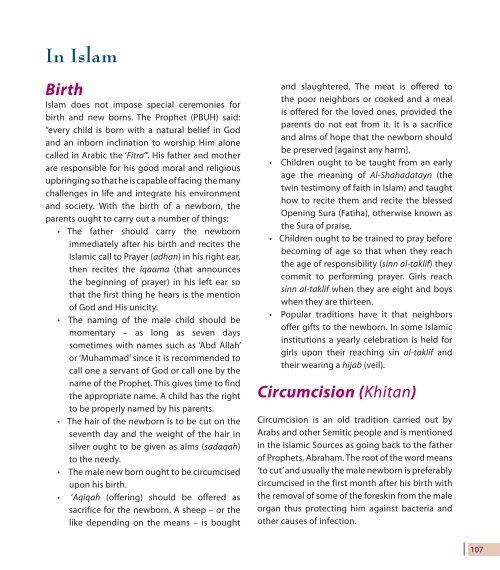Cultural aspects in Christian and Islamic religions - unesdoc - Unesco
Cultural aspects in Christian and Islamic religions - unesdoc - Unesco
Cultural aspects in Christian and Islamic religions - unesdoc - Unesco
You also want an ePaper? Increase the reach of your titles
YUMPU automatically turns print PDFs into web optimized ePapers that Google loves.
In Islam<br />
Birth<br />
Islam does not impose special ceremonies for<br />
birth <strong>and</strong> new borns. The Prophet (PBUH) said:<br />
“every child is born with a natural belief <strong>in</strong> God<br />
<strong>and</strong> an <strong>in</strong>born <strong>in</strong>cl<strong>in</strong>ation to worship Him alone<br />
called <strong>in</strong> Arabic the ‘Fitra’”. His father <strong>and</strong> mother<br />
are responsible for his good moral <strong>and</strong> religious<br />
upbr<strong>in</strong>g<strong>in</strong>g so that he is capable of fac<strong>in</strong>g the many<br />
challenges <strong>in</strong> life <strong>and</strong> <strong>in</strong>tegrate his environment<br />
<strong>and</strong> society. With the birth of a newborn, the<br />
parents ought to carry out a number of th<strong>in</strong>gs:<br />
<br />
immediately after his birth <strong>and</strong> recites the<br />
<strong>Islamic</strong> call to Prayer (adhan) <strong>in</strong> his right ear,<br />
then recites the iqaama (that announces<br />
the beg<strong>in</strong>n<strong>in</strong>g of prayer) <strong>in</strong> his left ear so<br />
that the first th<strong>in</strong>g he hears is the mention<br />
of God <strong>and</strong> His unicity.<br />
<br />
momentary – as long as seven days<br />
sometimes with names such as ‘Abd Allah’<br />
or ‘Muhammad’ s<strong>in</strong>ce it is recommended to<br />
call one a servant of God or call one by the<br />
name of the Prophet. This gives time to f<strong>in</strong>d<br />
the appropriate name. A child has the right<br />
to be properly named by his parents.<br />
<br />
seventh day <strong>and</strong> the weight of the hair <strong>in</strong><br />
silver ought to be given as alms (sadaqah)<br />
to the needy.<br />
<br />
upon his birth.<br />
Aqiqah (offer<strong>in</strong>g) should be offered as<br />
sacrifice for the newborn. A sheep – or the<br />
like depend<strong>in</strong>g on the means – is bought<br />
<strong>and</strong> slaughtered. The meat is offered to<br />
the poor neighbors or cooked <strong>and</strong> a meal<br />
is offered for the loved ones, provided the<br />
parents do not eat from it. It is a sacrifice<br />
<strong>and</strong> alms of hope that the newborn should<br />
be preserved [aga<strong>in</strong>st any harm].<br />
<br />
age the mean<strong>in</strong>g of Al-Shahadatayn (the<br />
tw<strong>in</strong> testimony of faith <strong>in</strong> Islam) <strong>and</strong> taught<br />
how to recite them <strong>and</strong> recite the blessed<br />
Open<strong>in</strong>g Sura (Fatiha), otherwise known as<br />
the Sura of praise.<br />
<br />
becom<strong>in</strong>g of age so that when they reach<br />
the age of responsibility (s<strong>in</strong>n al-taklif) they<br />
commit to perform<strong>in</strong>g prayer. Girls reach<br />
s<strong>in</strong>n al-taklif when they are eight <strong>and</strong> boys<br />
when they are thirteen.<br />
<br />
offer gifts to the newborn. In some <strong>Islamic</strong><br />
<strong>in</strong>stitutions a yearly celebration is held for<br />
girls upon their reach<strong>in</strong>g s<strong>in</strong> al-taklif <strong>and</strong><br />
their wear<strong>in</strong>g a hijab (veil).<br />
Circumcision (Khitan)<br />
Circumcision is an old tradition carried out by<br />
Arabs <strong>and</strong> other Semitic people <strong>and</strong> is mentioned<br />
<strong>in</strong> the <strong>Islamic</strong> Sources as go<strong>in</strong>g back to the father<br />
of Prophets, Abraham. The root of the word means<br />
‘to cut’ <strong>and</strong> usually the male newborn is preferably<br />
circumcised <strong>in</strong> the first month after his birth with<br />
the removal of some of the foresk<strong>in</strong> from the male<br />
organ thus protect<strong>in</strong>g him aga<strong>in</strong>st bacteria <strong>and</strong><br />
other causes of <strong>in</strong>fection.<br />
107

















